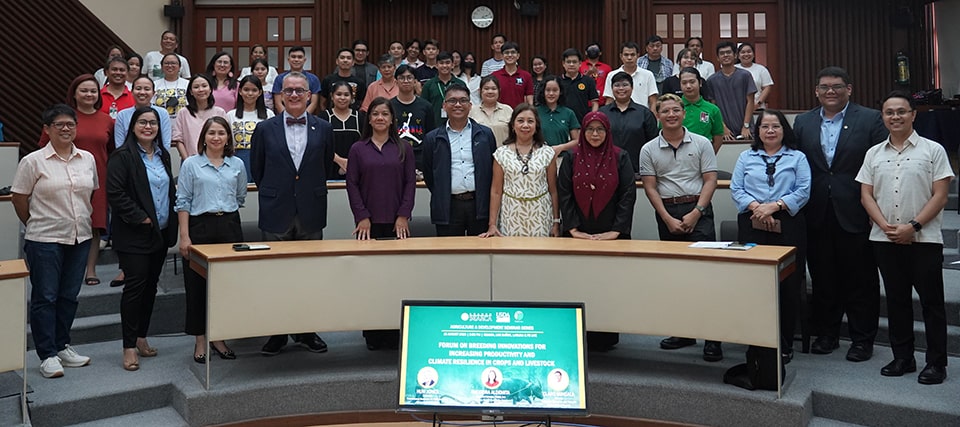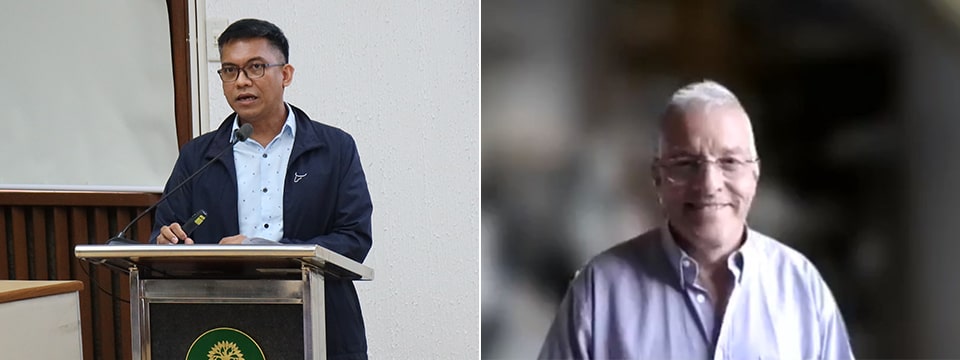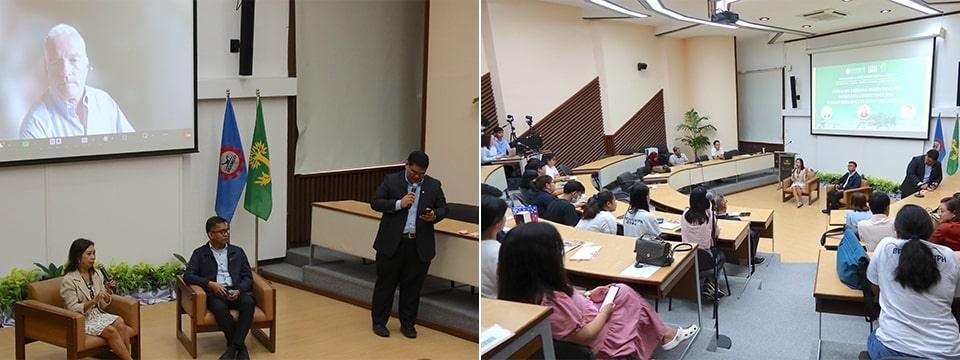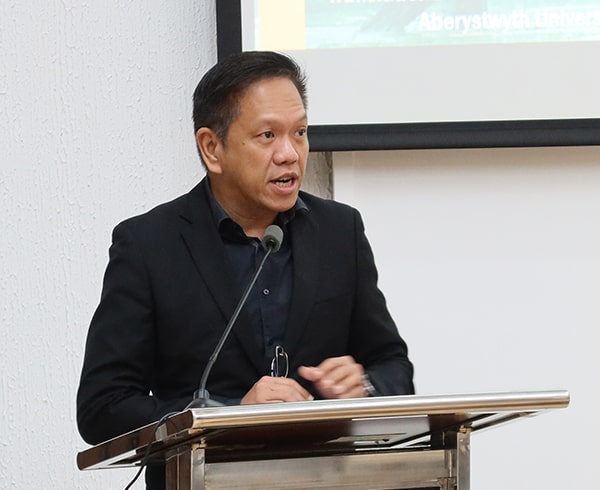 The participants, resource speakers, and organizers of the forum on Breeding Innovations for Increasing Productivity and Climate Resilience in Crops and Livestock.
The participants, resource speakers, and organizers of the forum on Breeding Innovations for Increasing Productivity and Climate Resilience in Crops and Livestock.
Rounding up this year's Biotech Outreach Series, the Southeast Asian Regional Center for Graduate Study and Research in Agriculture (SEARCA) together with the United States Department of Agriculture-Foreign Agricultural Service (USDA-FAS) Manila, and the International Service the Acquisition for Agri-biotech Applications (ISAAA), Inc. held a forum on Breeding Innovations for Increasing Productivity and Climate Resilience in Crops and Livestock on 15 August 2023 at the SEARCA headquarters. The hybrid event is part of the SEARCA Agriculture and Development Seminar Series (ADSS). It was livestreamed and may be reviewed through SEARCA's Facebook Page.
SEARCA's Deputy Director for Programs, Dr. Nur Azura Binti Adam noted that agri-biotech has been viewed unfavorably at times and hoped that the forum will open the public's minds about the technology. She also suggested inviting farmers to similar forums in the future so they can share their success stories and convince other farmers to use biotech crops. ISAAA, Inc.'s Executive Director, Dr. Rhodora Aldemita concurred and added that the forum is different from the previous ones since it is geared toward students who are future technology developers. "We would like to encourage students to go for agri-biotech in their career because we need new ideas and new people in the field," she added.
 (From left) Dr. Nur Azura Binti Adam, Dr. Rhodora Aldemita, and Mr. mark Hanzel give their opening messages.
(From left) Dr. Nur Azura Binti Adam, Dr. Rhodora Aldemita, and Mr. mark Hanzel give their opening messages.
Mr. Mark Hanzel, Agricultural Attaché of the USDA FAS from U.S. Embassy Manila, also emphasized that the Filipino youth represent the future of agricultural innovation in the country. Additionally, that misunderstanding and misinformation hinder developments in agri-biotech. "Even if people truly understand science and how it works, and things have been tested for decades and have been proven safe and effective, we still see policies succumbing to the pressures of misinformed view," Mr. Hanzel stated. "It's important that we take the knowledge, and we go out there with it and help people understand these things better," he added.
International and local experts on agri-biotechnology led the discussions. While Dr. Aldemita presented the crop innovations in the pipeline for productivity and climate resiliency, Dr. Claro Mingala, Director of the Philippine Agriculture and Fisheries Biotechnology Program, spoke about livestock innovations. They were joined by Dr. Huw Jones, Professor of Translational Genomics for Plant Breeding from Aberystwyth University, Wales. Dr. Jones presented the global regulatory landscape for new breeding innovations.
 Dr. Aldemita was joined by Dr. Claro Mingala (left) and Dr. Huw Jones (right) during the discussions.
Dr. Aldemita was joined by Dr. Claro Mingala (left) and Dr. Huw Jones (right) during the discussions.
One of the questions raised during the open forum was how to encourage the youth to get involved in agri-biotech aside from the usual forums. Dr. Aldemita responded that the curriculum is already in place in the University of the Philippines system and other schools still want to improve their curriculum and include agri-biotech as a major in their agriculture course. She added that several like-minded agencies in the country have also been working together to conduct activities and produce knowledge products for the youth. Dr. Jones pointed out that the concept of plant breeding and its types are something that younger children need to understand. He suggested that education and understanding on the topic should start much younger in the school curriculum. Meanwhile, Dr. Mingala shared that the Department of Agriculture-Biotechnology Program Office offers scholarships for undergraduates and higher studies.
 The experts and the onsite participants during the open forum.
The experts and the onsite participants during the open forum.
The participants also asked if the current regulations could keep up with new developments in the field. Dr. Aldemita explained that regulators always future-proof the regulations so they can be adjusted whenever there are new innovations. If some aspects need to be changed, it will always be science-based.
 Assoc. Prof. Joselito G. Florendo gives his parting words to the participants.Closing the program, SEARCA's Deputy Director for Programs, Assoc. Prof. Joselito G. Florendo, noted that he may have a different background, but he, too, has a role in advancing the country's agriculture sector. "I have a part in advocating for modern biotechnology as an important innovation that we can use, one option is to accelerate agricultural transformation in the Philippines and beyond," he said. "We may all be different but all of us can have a valuable contribution. Food security is everyone's business," he concluded.
Assoc. Prof. Joselito G. Florendo gives his parting words to the participants.Closing the program, SEARCA's Deputy Director for Programs, Assoc. Prof. Joselito G. Florendo, noted that he may have a different background, but he, too, has a role in advancing the country's agriculture sector. "I have a part in advocating for modern biotechnology as an important innovation that we can use, one option is to accelerate agricultural transformation in the Philippines and beyond," he said. "We may all be different but all of us can have a valuable contribution. Food security is everyone's business," he concluded.
The forum, which aims to create an interactive platform of engagement with key stakeholders to discuss the latest updates, emerging issues, and concerns for an improved understanding and acceptance of biotechnology in the country, gathered more than 200 participants online and onsite.